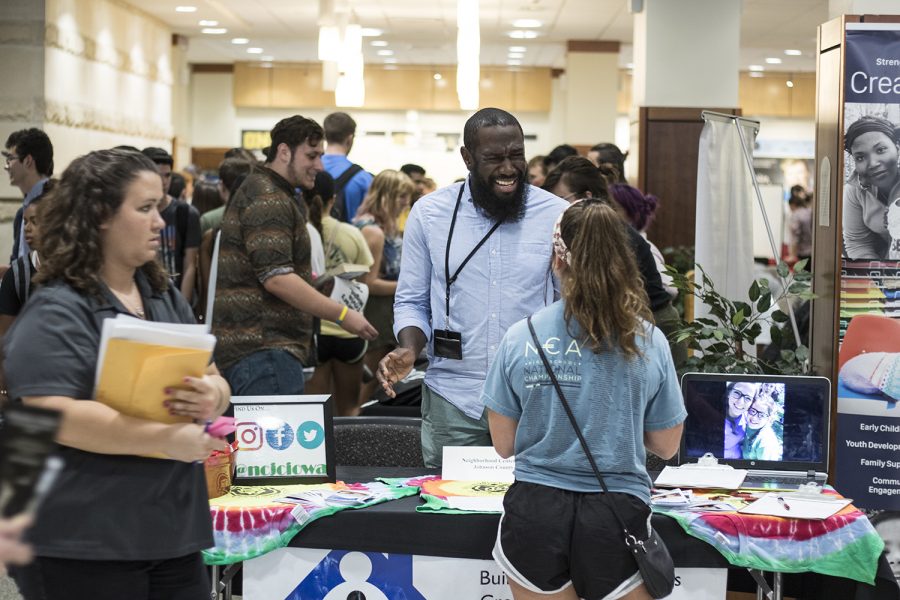Hegde: Getting involved on campus is vital
The importance of student participation in extracurricular organizations is not lost on the University of Iowa where students are encouraged to get involved.
Tony Branch from the Neighborhood Centers of Johnson County speaks to an inquiring student at the student Organization Fair in the IMU on Thursday, Aug. 30, 2018.
September 4, 2018
After the first month of the fall semester is complete, it usually begins to sink in for students that the college routine is a reality. For some, this may induce panic as they realize that they still don’t feel like their complete selves on campus.
To offer a solution, numerous university organizations teamed up to host the yearly activities fair, Havoc on Hubbard — held inside the IMU this year — which included more than 250 organizations of all varieties. While the fair is not mandatory, it delivers a vital opportunity that every student deserves: to meet with groups that could shape a person’s college career.
The Center for Student Involvement & Leadership was one of the organizations that hosted the event. With the three core goals to help students find their places, do purposeful things outside of the classroom, and have fun, the center hopes to ensure that students know their options of how to be involved. Paul Mintner, the associative director of the the group’s Leadership & Service Programs, said, “What you do outside the classroom prepares you for what’s after your time as a Hawkeye.”
Extracurriculars are an ideal way to boost students’ résumés, adding unique, real-world abilities that often go past the skills related to their majors.
More than building skills, student organizations are the key manner in which students meet like-minded peers and form a support system — much-needed when enduring the early mornings and late nights of stressful college life. According to the Anxiety and Depression Association of America, 41.6 percent of students believed that anxiety was one of the major problems college students could face. One of the association’s notes of assistance included reaching out to a friend. This could be challenging if a student feels alone on campus. Mintner emphasized that “[the center believes] very seriously that students ought to have someone on campus who knows they are there, and a student organization is the first place to start.”
Getting involved provides students a significant chance to find their places on campus.
Where does Havoc on Hubbard come in? The event was unique in that it showcased a variety of activities with backgrounds ranging from sports to spiritual clubs to international groups. It was one of the only events in which a student could learn about numerous types of groups at once, opposed to going to an event only featuring volunteer organizations or religious clubs.
Havoc on Hubbard gave students an opportunity to meet members in person and a larger chance of finding the exact type of group(s) they wished to take part in.
While Havoc on Hubbard can seem to cater solely to freshmen, it aimed to reach students in all years, including some clubs looking specifically for graduate and professional students in the university. Students who were unable to attend Havoc on Hubbard should not be discouraged; many organizations are still recruiting or will recruit in the spring. Going to https://uiowa.campuslabs.com/engage/still lets students search for exactly what extracurricular they have in mind.
No matter what year a student is in, there are times in college that can make people feel very alone. To have an extracurricular means having a group to distract them from the stresses of university and a chance to meet friends who could provide support past students’ years in college. In the end, all Hawkeyes deserve to be part of a college organization during their student careers.















